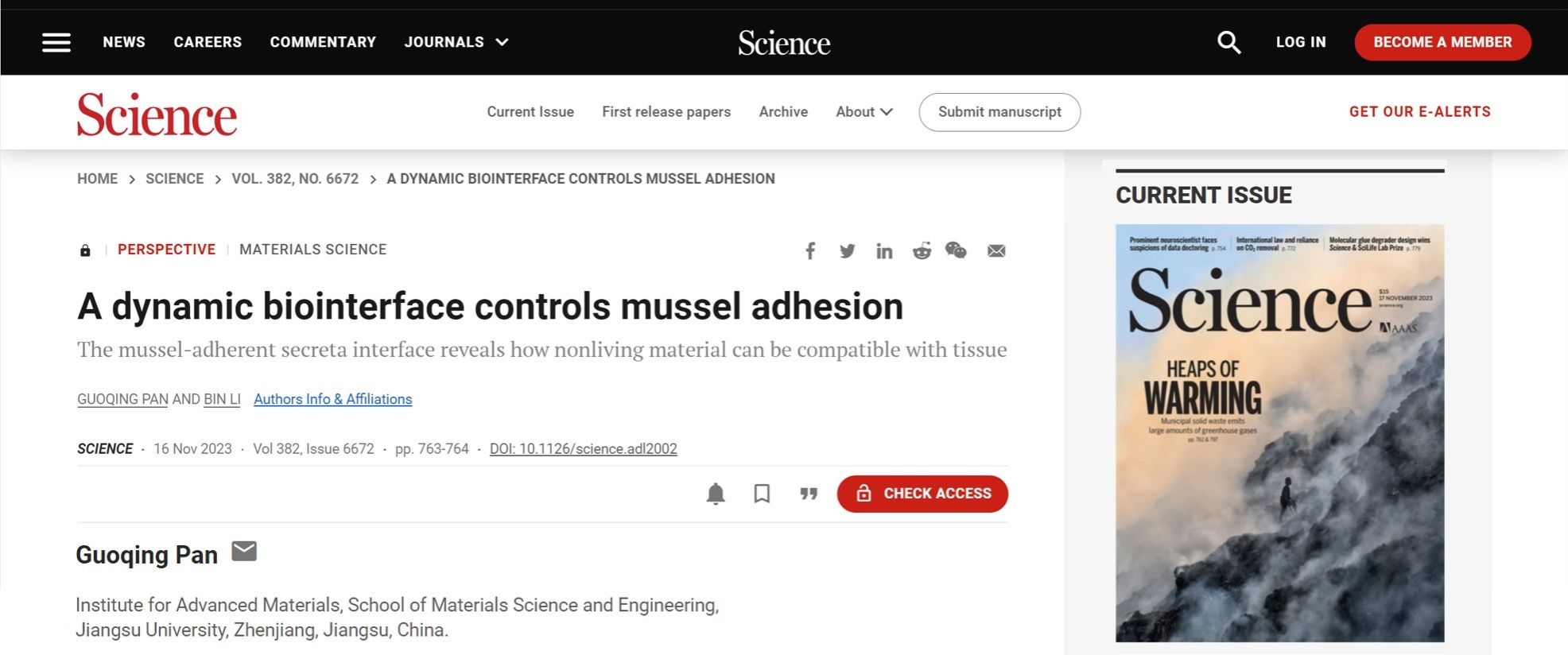On November 17, the internationally renowned academic journal Science published a Perspective paper entitled "A dynamic biointerface controls mussel adhesion" (Doi: 10.1126/science.adl2002) co-authored by Professor Pan Guoqing from the School of Materials Science and Engineering of Jiangsu University and Professor Li Bin from Soochow University. The School of Materials Science and Engineering and the Institute of Advanced Materials of Jiangsu University are the first units of the paper, and Professor Pan Guoqing is the first and corresponding author of the paper.
This paper analyzes the important findings of dynamic biological interfaces recently published by researchers from McGill University in Canada and New York University in the United States (Doi: 10.1126/science.adi7401; 10.1126/science.abh1614), and combined with the latest progress in the field of surface interface of medical materials in recent years, the bionic design of biomaterials and the compatibility of medical materials and tissues are reviewed and prospected. The authors first investigated the dynamic adhesion mechanism of marine mussels by analyzing the previously revealed multiscale hierarchical structure between the foot silk (a nonliving protein material secreted by mussels) and the autologous tissue. It is emphasized that the multipoint microcontacting mechanism is the key to the controllable connection between the mussel and foot silk dynamic biological interface (shown below), rather than relying solely on the special chemical interactions on its surface. The authors are keen to point out that the multi-point micro-contact mechanism involved in this natural dynamic multi-scale hierarchical biological interface is not unique to mussel organisms, and the relevant mechanisms are expected to provide design ideas for dynamic tissue-compatible biomaterials. In particular, the multi-scale hierarchical structure is also found at the interface between the tail and the body of the reptilian lizard. However, when it is threatened, the failure of the local micro-contact point triggered by tail swing can cause the fracture of the whole interface, that is, the self-cutting behavior (see figure below). Based on these findings, the authors suggest that the multipoint microscale contact mechanism may be a general strategy to achieve strong and dynamic surface-interface interactions, and that this mechanism may also exist in the unexplored shrimp and crab chelicerae.
Finally, the authors point out that the dynamic biological surface interface involved in mussels and other organisms is expected to provide a feasible solution for the improvement of
tissue-cell compatibility of current biomaterials. The bionic construction of related structures has broad application prospects in detachable implantable materials (such as biosensors
and medical implants), and even in interdisciplinary fields such as dynamic brain-computer interface.
Original link: https://www.science.org/doi/full/10.1126/science.adl2002
Dr. Pan National Day, Jinshan Distinguished Professor, Researcher and Doctoral Tutor of Jiangsu University, joined Jiangsu University in 20

18 through our overseas high-level
academic forum. He has been selected as the Marie Curie Individual Fellow of the European Union, the National Outstanding Youth Fund, the Jiangsu Province Outstanding
Youth Fund and the Jiangsu Province Distinguished Professor Program. In Science, PNAS, JACS, Innovation, Angew.Chem.、Acc. Chem. Res.、Chem. Soc. Rev.And other
journals published many academic papers, papers cited more than 7000 times, H-index is 46, more than 10 papers shortlisted ESI high-cited papers. Served as Associate Editor
of SmartMater. Med. Journal, J. Orthop. Transl., Chin. Chem. Lett.Young magazine editors. He is a member of Surface and Interface Engineering Branch of Chinese Society of
Biomaterials and Rehabilitation Devices and Biomaterials Branch. Our research interests focus on dynamic biomaterials and their surface interfaces, molecularly imprinted
biological recognition, tissue repair and regeneration.
(Institute of Materials, Institute of New Materials)
